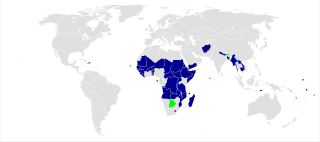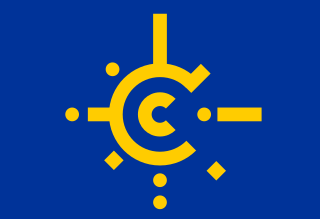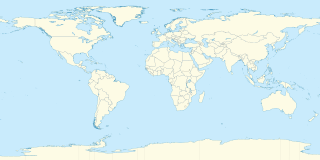General Agreement on Tariffs and Trade (GATT) was a legal agreement between many countries, whose overall purpose was to promote international trade by reducing or eliminating trade barriers such as tariffs or quotas. According to its preamble, its purpose was the "substantial reduction of tariffs and other trade barriers and the elimination of preferences, on a reciprocal and mutually advantageous basis."

The World Trade Organization (WTO) is an intergovernmental organization that is concerned with the regulation of international trade between nations. The WTO officially commenced on 1 January 1995 under the Marrakesh Agreement, signed by 124 nations on 15 April 1994, replacing the General Agreement on Tariffs and Trade (GATT), which commenced in 1948. It is the largest international economic organization in the world.

The Least Developed Countries (LDCs) is a list of developing countries that, according to the United Nations, exhibit the lowest indicators of socioeconomic development, with the lowest Human Development Index ratings of all countries in the world. The concept of LDCs originated in the late 1960s and the first group of LDCs was listed by the UN in its resolution 2768 (XXVI) of 18 November 1971.
In international economic relations and international politics, "most favoured nation" (MFN) is a status or level of treatment accorded by one state to another in international trade. The term means the country which is the recipient of this treatment must nominally receive equal trade advantages as the "most favoured nation" by the country granting such treatment. In effect, a country that has been accorded MFN status may not be treated less advantageously than any other country with MFN status by the promising country. There is a debate in legal circles whether MFN clauses in bilateral investment treaties include only substantive rules or also procedural protections.

The Central European Free Trade Agreement (CEFTA) is a trade agreement between non-EU countries, members of which are now mostly located in Southeastern Europe. Founded by representatives of Poland, Hungary and Czechoslovakia, CEFTA expanded to Albania, Bosnia and Herzegovina, Bulgaria, Croatia, Moldova, Montenegro, North Macedonia, Romania, Serbia, Slovenia and the UNMIK.

The Doha Development Round or Doha Development Agenda (DDA) is the trade-negotiation round of the World Trade Organization (WTO) which commenced in November 2001 under then director-general Mike Moore. Its objective was to lower trade barriers around the world, and thus facilitate increased global trade.
Turkey is a founding member of the United Nations, the Organisation of the Islamic Conference, the Organisation for Economic Co-operation and Development and the Organization for Security and Co-operation in Europe, a member state of the Council of Europe since 1949, and of NATO since 1952. Since 2005, Turkey is in accession negotiations with the European Union, having been an associate member since 1963. Turkey is also a member of the G20 industrial nations which brings together the 20 largest economies of the world.
The original member states of theWorld Trade Organization are the parties to the GATT after ratifying the Uruguay Round Agreements, and the European Communities. They obtained this status at the entry into force on 1 January 1995 or upon their date of ratification. All other members have joined the organization as a result of negotiation, and membership consists of a balance of rights and obligations. The process of becoming a World Trade Organization (WTO) member is unique to each applicant country, and the terms of accession are dependent upon the country's stage of economic development and the current trade regime.
This is a timeline of the World Trade Organization (WTO).

Montenegro–Russia relations are foreign relations between Montenegro and Russia. Montenegro has an embassy in Moscow and Russia has an embassy in Podgorica.
The Ministerial Conference is the top decision making body of the World Trade Organization (WTO). There have been eleven ministrial conferences from 1996 to 2017, usually every two years.

The accession of Montenegro to NATO (NATO) took place on 5 June 2017. In December 2009, Montenegro was granted a Membership Action Plan, the final step in an application for membership in the organization. A formal invitation was issued by the alliance on 2 December 2015, with accession negotiations concluded with the signature by the Foreign Ministers of an Accession Protocol on 19 May 2016. Montenegro officially joined NATO on 5 June 2017.

Iran officially submitted an application to join the World Trade Organization (WTO) on 19 July 1996. From July 1996 to May 2001, Iran’s application had not been considered, mainly as a result of US objections and the US veto power in the WTO Council. From May 2001 Iran’s application for WTO membership has been brought up 22 times. At the 22nd time, on 26 May 2005, Iran’s application for WTO membership was approved unanimously by the organization’s members. Thus the process of Iran’s membership in the WTO started. Once Iran’s application was accepted and examined by WTO General Council, Iran became WTO observer member and started the process of full membership in the organization. In November 2009 Iran submitted the Foreign Trade Regime Memorandum as the process of accession entered a new phase.

As of January 2019, UNESCO members include 193 member states and 11 associate members. Some members have additional National Organizing Committees (NOCs) for some of their dependent territories. The associate members are non-independent states.
The Bali Package is a trade agreement resulting from the Ninth Ministerial Conference of the World Trade Organization in Bali, Indonesia on 3–7 December 2013. It is aimed at lowering global trade barriers and is the first agreement reached through the WTO that is approved by all its members. The package forms part of the Doha Development Round, which started in 2001.
The Ninth World Trade Organization Ministerial Conference was held in Bali, Indonesia from 3 to 7 December 2013. The conference was chaired by the Indonesian Trade Minister Gita Wirjawan.

The Tenth World Trade Organization Ministerial Conference was held in Nairobi, Kenya from 15 to 19 December 2015. The conference was chaired by the Kenyan Foreign Affairs Minister Amina Mohamed.
Afghanistan received membership to the World Trade Organization (WTO) at the 10th WTO Ministerial Conference in Nairobi, Kenya, December 17, 2015. Afghanistan is 164th in the world and 36th among the less-developed countries that have received WTO membership.














